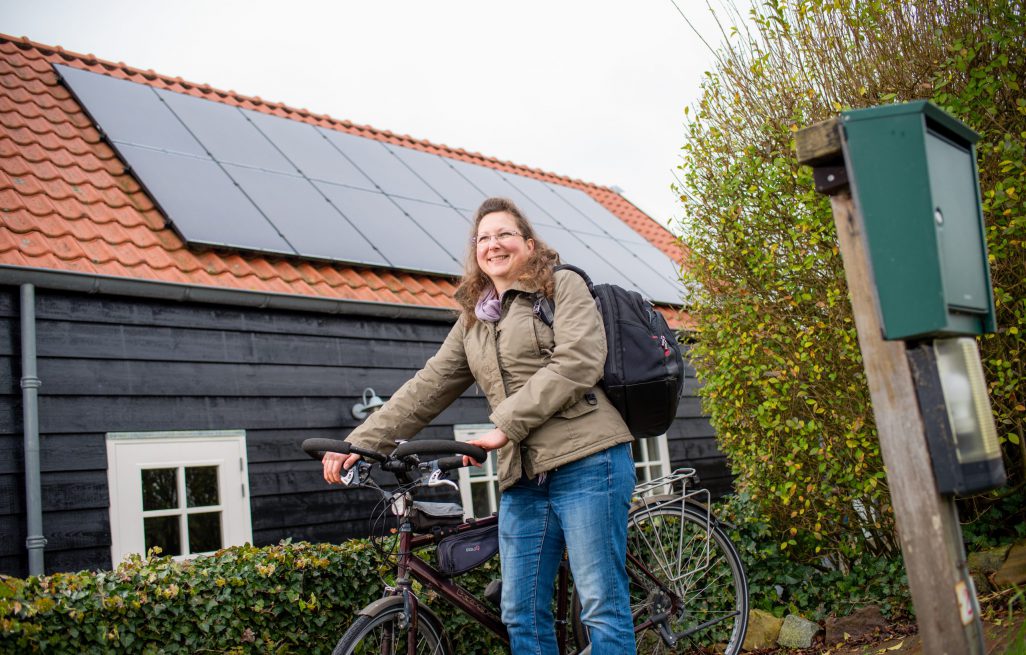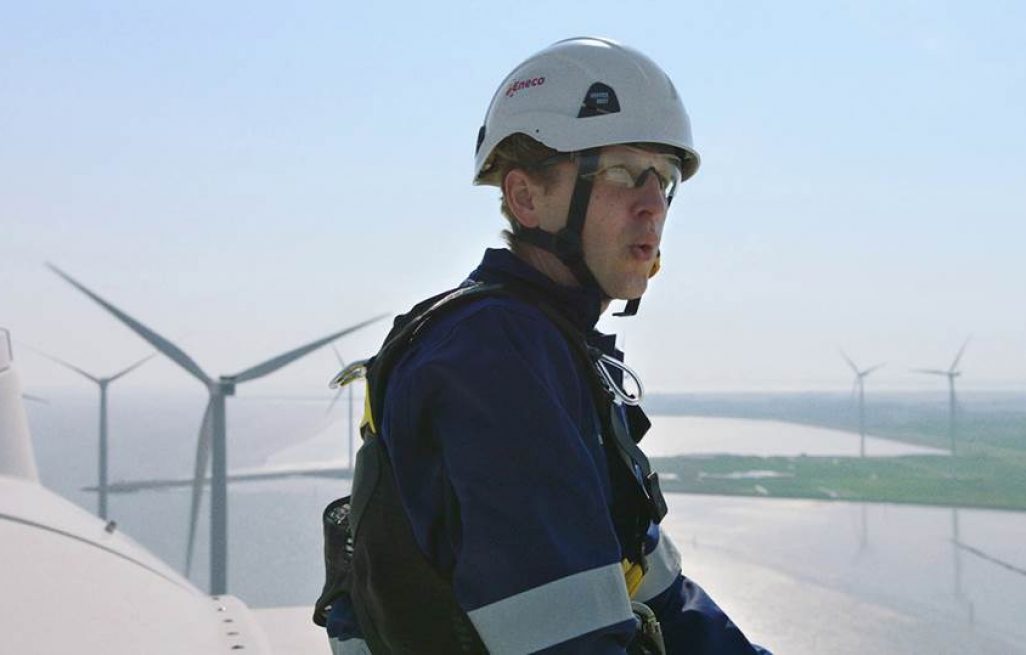
‘Thinking outside the sustainability box’
Ilse van Andel, Sustainability Officer
Eneco is a frontrunner in the energy transition. In 2007, Eneco presented its sustainable One Planet strategy with the World Wildlife Fund. In the years that followed, substantial steps were taken. The scope of Eneco’s sustainability policy for 2021-2025 goes much further than many stakeholders realise. A look behind the scenes at Eneco’s approach to sustainability in an interview with Sustainability Officer Ilse van Andel.
Ilse: ‘Eneco plays a prominent role in society. Our roots go back to the 19th century. In 2007, we were the first energy company to adopt a sustainable path and we are still on it. This is how Eneco became a frontrunner in the energy transition, both in Belgium and in the Netherlands. We are one of the largest investors in sustainable energy, and we work with millions of consumers and thousands of businesses on the energy transition. As Sustainability Officer, I am committed to making our supplier portfolio and the products and services we purchase more sustainable. This role goes beyond sustainable procurement. My aim is also to further advance circularity and contribute to our sustainability strategy by identifying CSR risks in the value chain.’
Towards a One Planet 2021 -2025 vision
Ilse van Andel
Climate impact key focus
Ilse: ‘Our climate impact is a key focus in everything we do. Our One Planet vision, which was developed by our Sustainability Manager, Gerben Meijer, outlines our intention to keep global warming well below 2°C. Our target is 1.5°C. The agreements to achieve this goal have been incorporated into a carbon budget for our company, including our suppliers and customers. In 2020, the carbon budget was 17.8 Mton CO2 equivalents and our emissions amounted to 14.0 Mton CO2 equivalents. Since the signing of the Paris Climate Agreement in 2015, our supply chain emissions have remained below the agreed carbon budget. Of course, that is excellent. In fact, Eneco scores best on sustainability compared to the large energy companies in the Netherlands according to the NGO sustainability ranking. The share of sustainable electricity production in the total supply must be 50% by 2022, and in 2020 it amounted to 28.2%. Together, we are moving towards 100% sustainable mobility. We are not using coal or nuclear energy and have opted for gas as a transition fuel. Our aim is to ensure that our activities do not have a negative net impact on biodiversity and ecosystems, and to further enhance our circularity policy. In short, we are making a broad social contribution to the energy transition.’
EcoVadis Platinum CSR Rating
One Planet vision 2021-2025: climate, value chain and employership
‘In the meantime, we’ve gone a step further. With One Planet, we are essentially creating a vision with a strong focus on social and ethical aspects with three clear directions: climate action, value chain responsibility and good employment practices. This vision shows our intention to go beyond the primary objective of the energy transition. For example, we will look at the raw materials used in the turbines in our wind farms and focus on long-term recycling with the aim of optimal circularity to recover pure raw materials. Of course, it is good to use wind turbines and solar panels to accelerate the transition to a sustainable electricity supply, but which raw materials are actually needed to produce those wind turbines and solar panels, and in which quantities? We endorse the conclusions of the Copper 8 study by Metabolic and the Centre for Environmental Sciences of Leiden University, which suggest that the global production of critical metals is insufficient to achieve a transition to a sustainable electricity system. That is why we are calling on the government to include a clear translation of its vision on circularity in tenders,’ says Ilse van Andel.
I expected suppliers to take on a more proactive attitude
Ilse van Andel
Benchmark scores are good, but we want to go further
According to Ilse, Eneco essentially scores well compared to other companies. ‘Our benchmark scores are definitely strong. EcoVadis assesses companies on their sustainable performance and corporate social responsibility, and we were given the Platinum CSR Rating. This means that we are among the top 1% of companies in our sector in terms of CSR. When it comes to sustainable procurement, we are among the top 4% in our industry. Our current ESG score from Sustainalytics is 76 points out of a maximum of 100. We are considered an Outperformer with this ESG score, among the top 15%. At the initiative of investors, the CDP Climate Change Programme approaches companies to share their climate footprint and thus improve risk assessment. In 2020, Eneco voluntarily participated for the fourth time and was given an A, which is above average for the sector (C) and for Europe (C). In short, we are satisfied with our benchmarks, but we want more, which means going further than the law stipulates and continuing where others stop.’
Sustainalytics: Eneco is an Outperformer
Quantifying social costs
Ilse: ‘What makes Eneco stand out is that we take responsibility for the entire chain in which we operate, so we are helping customers to switch to sustainable energy. That is why we report on the entire scope. Not only on the emissions of our own business operations, but also on the related emissions of our suppliers and customers. The ambitions outlined in One Planet 2021-2025 place more emphasis on our value chain responsibility by weighing the negative impact of resource depletion on biodiversity and nature, and by fully integrating these interests into development and design choices. This will enable us to quantify the social costs. After all, we play a prominent role in society and have to think outside the sustainability box. That means looking, thinking and acting beyond our primary scope of emissions.
Material issues and SDGs
‘We also want to look beyond the material issues in our materiality analysis,’ Ilse says. ‘For example, inclusiveness and gender equality, safe working conditions for our employees, a secure environment and better production conditions in the mines where copper and other precious metals are extracted and used in our wind turbines and solar panel systems. We have also embraced the SDGs (the United Nations Sustainable Development Goals) but want to take more responsibility in meeting these goals, for example by expanding our green energy production capacity, scaling up digitalisation and or ensuring more responsible procurement. We want to encourage our suppliers to be creative and challenge them to think proactively with us to minimise social costs. After all, that is what it means to represent your society.’
Focus on fully circular wind farms
Ilse van Andel


Pushing our suppliers
We are in constant dialogue with our suppliers. After all, our impact is partly caused by the purchase of goods and services. Eneco prefers to do business with suppliers who share our passion for sustainability. We are convinced that a joint focus on quality and sustainability leads to optimisation and innovation. With Socially Responsible Procurement (SRP), we shifted the focus in our regular procurement process and are also considering social and ecological criteria when selecting suppliers. In every procurement procedure, we ask ourselves and our suppliers whether we can fulfil the requirement in a more sustainable or more circular way. We want 60% of our contracts to contain one or more of the SRP criteria and 20% of these contracts to be circular. And we would like to see at least 40% of our strategic suppliers act in a socially responsible way at the “leader” level. We are developing action plans with our suppliers to create win-win situations. Sometimes it works out extremely well, but sometimes we are disappointed. I would actually like to see our suppliers take on a more proactive attitude and challenge us instead of the other way around. As it is, we have to encourage suppliers to introduce these changes themselves,’ says Ilse.
CDP Climate Change Programme
Score: ABusiness customers and consumers
‘We have noticed that some business customers take sustainability and therefore the energy transition seriously, but there are also those that operate in a “grey” area when it comes to sustainability and cannot be viewed as transition innovators. We have a role to play in that respect, as does the government, namely to further encourage and help these companies to make the transition. On the consumer side, we already supply green electricity and use different means to point out opportunities for generating energy locally and to emphasise what they can do to save energy. Think, for example, of solar cells, wind, insulation and efficiency measures. Of course, the price is important, but if you take the broader view, then you have to start thinking outside the box.’
Managing conflicting interests
Ilse: ‘By definition, playing a prominent role in society means having to deal with conflicting interests. That can be really difficult. We aim to be completely transparent and engage communities – local residents, municipalities and provinces – at the earliest possible stage. We want to involve residents in the energy transition, for example by making them co-owners of wind or solar farms, by thinking about how to optimise the cast shadow of wind turbines, by investing in local facilities and neighbourhoods, and by implementing technical improvements with them.
Dream
Ilse concludes that Eneco is doing well in terms of its social role, but there is still a long way to go. ‘My dream is for us to be the first to build fully circular wind farms and for NGOs to view us as an exemplary company in the field of human rights and materials policy. I intend to wholeheartedly commit myself to this endeavour.’